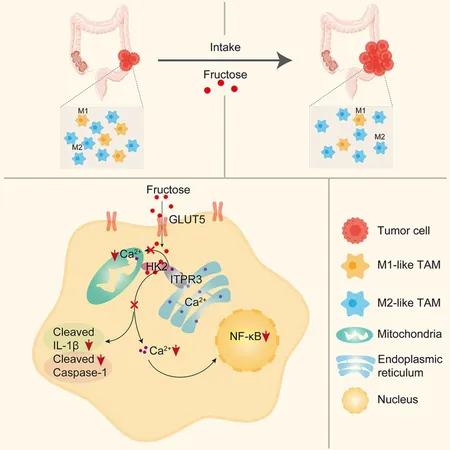
Shocking Discovery: How Fructose Could Be Fueling Colorectal Cancer Growth!
2024-11-11
Author: Siti
Introduction
Recent research has unveiled alarming connections between fructose consumption and an increased risk of colorectal cancer. A common ingredient in a variety of processed foods and beverages—including sodas, candies, and baked goods—fructose is the world’s most prevalent food sweetener. Unfortunately, while it adds sweetness to our diets, excessive intake has been linked to serious metabolic issues like obesity, diabetes, and fatty liver disease.
Emerging Evidence
What’s particularly concerning is the emerging evidence suggesting that high fructose consumption may also escalate the risk of developing colorectal cancer. While previous epidemiological studies have drawn attention to this dangerous association, the intricate biological mechanisms at play have remained largely obscure—until now.
Groundbreaking Study
A groundbreaking study published in the prestigious journal *Cell Metabolism* reveals critical new findings led by Professor Piao Hailong from the Dalian Institute of Chemical Physics. Collaborating with other experts, the research team made an astonishing discovery regarding the role of fructose in cancer progression: it appears to inhibit the ability of a specific type of immune cell known as M1-type tumor-associated macrophages (M1-like TAMs) to polarize, a process that can enhance tumor growth.
Fructose Metabolism and Immune Response
Delving deeper, the researchers noticed that fructose metabolism proceeds at a slower rate in macrophages compared to liver cells, which are key players in processing fructose. They employed advanced techniques, including 13C-labeled fructose metabolic flux analysis, to uncover how fructose disrupts normal immune response through an enzyme called hexokinase 2 (HK2). This disruption appears to play a critical role in promoting colorectal cancer development by thwarting the polarization of M1-like TAMs.
Critical Interactions
The scientists also found that fructose led to a significant interaction between HK2 and another protein, inositol 1,4,5-trisphosphate receptor type 3 (ITPR3). This interaction curtailed the formation of mitochondria-associated endoplasmic reticulum membranes (MAM) and reduced calcium concentrations in both the cytoplasm and the mitochondria. As a result, the formation of signaling pathways essential for immune cell activation was inhibited.
Reversing Harmful Effects
Remarkably, the study further illustrated that using genetic techniques to eliminate the glucose transporter 5 (GLUT5) or modifying HK2 in macrophages could counteract fructose's negative actions, reversing its harmful effects on MAM and calcium levels.
Suppression of Cellular Processes
These findings have crucial implications, as the lowered calcium levels were shown to suppress several critical cellular processes, including the activation of the p38 MAPK pathway and the inflammasome involved in immune responses. This suppression contributes to the inhibited polarization of M1-like TAMs, potentially paving the way for colorectal cancer's unchecked progression.
Conclusion
In light of these revelations, Professor Piao emphasized that “Our study reveals a novel role of fructose as a signaling molecule that promotes colorectal cancer by inhibiting M1-like TAMs polarization.”
Health Implications
What does this mean for your health? With the dangers of excessive fructose consumption becoming increasingly clear, it may be time to rethink our dietary choices. Cutting back on sugary beverages and processed foods could be a vital step in the fight against colorectal cancer and other serious health issues. Stay vigilant, because your next soda might not just quench your thirst, but also put your health at risk!


 Brasil (PT)
Brasil (PT)
 Canada (EN)
Canada (EN)
 Chile (ES)
Chile (ES)
 España (ES)
España (ES)
 France (FR)
France (FR)
 Hong Kong (EN)
Hong Kong (EN)
 Italia (IT)
Italia (IT)
 日本 (JA)
日本 (JA)
 Magyarország (HU)
Magyarország (HU)
 Norge (NO)
Norge (NO)
 Polska (PL)
Polska (PL)
 Schweiz (DE)
Schweiz (DE)
 Singapore (EN)
Singapore (EN)
 Sverige (SV)
Sverige (SV)
 Suomi (FI)
Suomi (FI)
 Türkiye (TR)
Türkiye (TR)